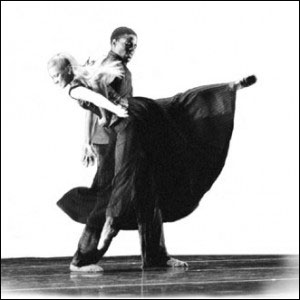Composer and percussionist John Santos and choreographer Robert Moses collaborated with the Oakland Ballet to create a new work, Unión Fraternal, based on the Danzón tradition from Cuba. The 22-minute piece was set on 12 dancers, and Santos’s music was scored for six musicians. Together the artists sought to evoke the restrained movements of the Danzón’s European roots along with its underlying African themes.
The work developed gradually out of Santos’s and Moses’ active and vital exchange with one another and with the Ballet’s dancers. Danzón master Roberto Borrell (also a Creative Work Fund grant recipient) conducted two workshops with the Ballet’s dancers to introduce them to the traditional form of the dance. John Santos had had extensive prior experience with the Danzón, having composed, performed, and recorded danzones and derivatives for more than 20 years. Although choreographer Robert Moses is known primarily as a modern dance choreographer, he previously had collaborated with, or choreographed for ballet works with Alonzo King, Larry Pech, and Julia Adams.
Ronn Guidi, an Oakland native and student of Raoul Pause founded the Oakland Ballet in 1965. It has commissioned work by some of the Bay Area’s most innovative contemporary choreographers.
Unión Fraternal premiered to live music during the Ballet’s 2000 season. Response was so strong that they remounted it for the 2001 season. Additionally, the Cincinnati Ballet performed it in April 2002. In May, 2002, John Santos won a San Francisco Bay Area Isadora Duncan Dance Award (Izzy) for best sound in a dance performance for the piece.

